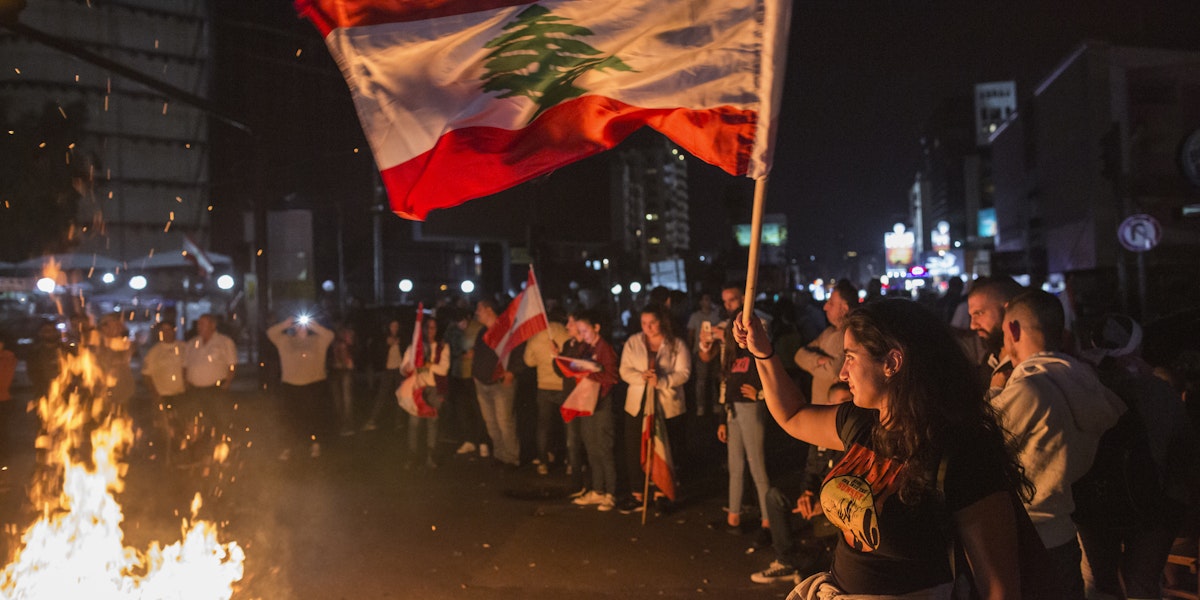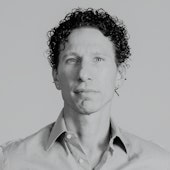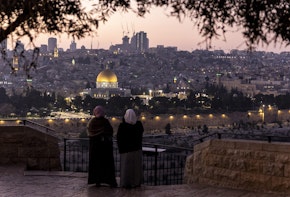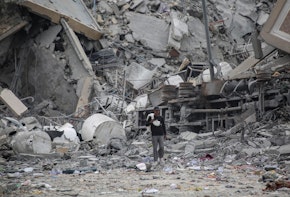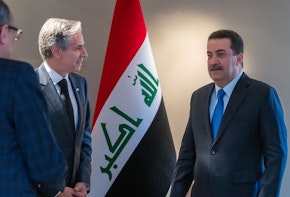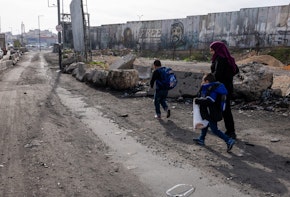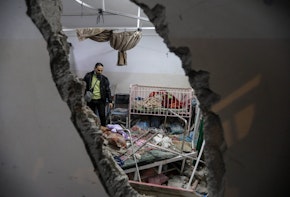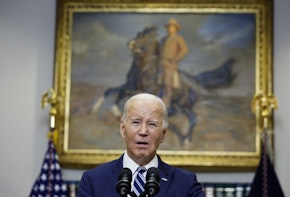The Century Foundation’s researchers have been closely following the most recent protests in Iraq and Lebanon, considering them in the context of a decade of revolts and a period of major geopolitical upheaval in the region. TCF fellows and contributors Thanassis Cambanis, Dina Esfandiary, Sima Ghaddar, Michael Wahid Hanna, and Aron Lund discuss some of the forces at play in the popular uprisings in Iraq and Lebanon, and the implications for policy in the region and in the West.
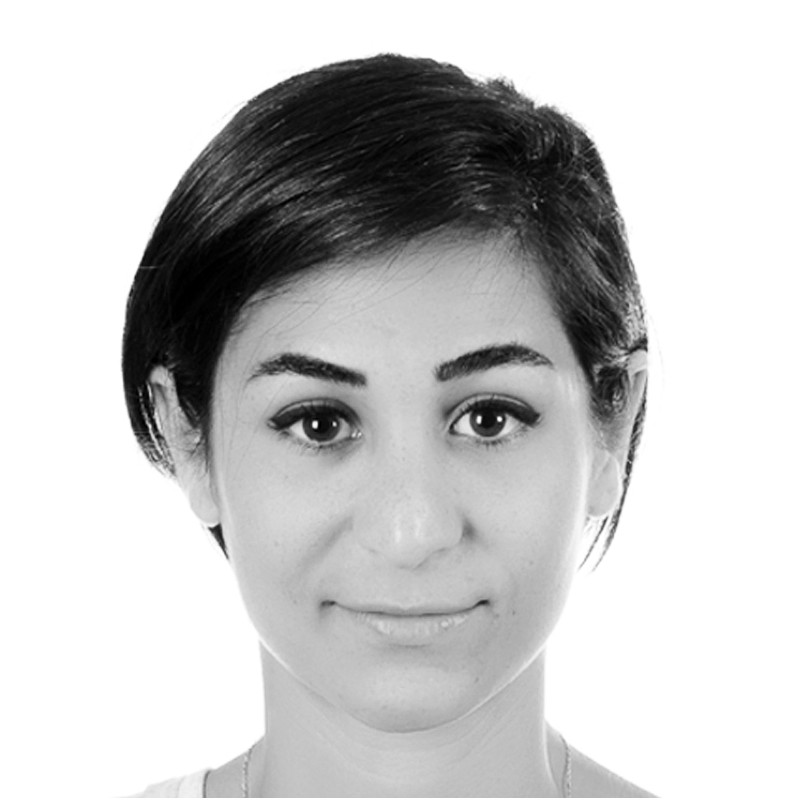 Sima: I just returned from a few weeks in Lebanon, and I found the protests breathtaking in their resourcefulness and intensity. At the same time, the ruling order is working overtime to figure out how to stay in power. One key development is the manner in which Hezbollah has allied itself with the status quo, and has chosen not to distance itself from its political allies, Amal and the Free Patriotic Movement (FPM). Both Amal and FPM have well-earned reputations for corruption, and, historically, Hezbollah has presented itself as a sort of partner-at-a-distance. Because Hezbollah is listed as a terrorist group by so many Western governments, it chooses to wield much of its political power in Lebanon through allies, so that the Lebanese government will not be blackballed. But now Hezbollah is saddled by this close relationship with two notoriously corrupt parties.
Sima: I just returned from a few weeks in Lebanon, and I found the protests breathtaking in their resourcefulness and intensity. At the same time, the ruling order is working overtime to figure out how to stay in power. One key development is the manner in which Hezbollah has allied itself with the status quo, and has chosen not to distance itself from its political allies, Amal and the Free Patriotic Movement (FPM). Both Amal and FPM have well-earned reputations for corruption, and, historically, Hezbollah has presented itself as a sort of partner-at-a-distance. Because Hezbollah is listed as a terrorist group by so many Western governments, it chooses to wield much of its political power in Lebanon through allies, so that the Lebanese government will not be blackballed. But now Hezbollah is saddled by this close relationship with two notoriously corrupt parties.
Much of the political stability in Lebanon comes from sectarian elites dividing the state among themselves, and working together to maintain their hold on power. Much of that power is then exchanged for political support through clientelism and division of power along sectarian lines. Therefore, if any one faction defects from that bargain, then the whole settlement falls apart. For Hezbollah, access to the state and to political power depends on inter-sectarian elite accommodation, and their own intra-sectarian alliances.
 Thanassis: So why has Hezbollah decided that reform is a red line? Why is it willing to so overtly commit to the status quo? In the past, Hezbollah has been willing to challenge the established order to secure more power, even using force—but that was when Hezbollah could cast itself as the underdog.
Thanassis: So why has Hezbollah decided that reform is a red line? Why is it willing to so overtly commit to the status quo? In the past, Hezbollah has been willing to challenge the established order to secure more power, even using force—but that was when Hezbollah could cast itself as the underdog.
Hezbollah’s Status Quo Bet
 Sima: Hezbollah risks losing a lot if the status quo collapses. That’s why Hezbollah hasn’t seriously supported political reform and accountability. Hezbollah is willing to jeopardize its stature in the eyes of its Shia constituency. It is also willing to face harsh criticism from a more liberal and secular, or aggrieved, public that is no longer afraid to question Hezbollah’s command over the Shia street, or criticize Hezbollah’s military power and dogmatic control over politics in the country. From my conversations with Hezbollah sympathizers, many are dismayed that Hezbollah secretary general, Hassan Nasrallah, would not at least hold the party’s own representatives in parliament and government accountable. “If you are in it or know of it, then you are a partner-in-crime,” one said. Still, most were also sympathetic to the party’s hard-line position. Staunch supporters see the entire protest movement as a threat to Hezbollah’s military prowess, a threat that those supporters are absolutely willing to fight. Hezbollah is holding onto its partnership with the FPM, a Christian party that controls the nation’s presidency, as a way for the organization to abate this threat.
Sima: Hezbollah risks losing a lot if the status quo collapses. That’s why Hezbollah hasn’t seriously supported political reform and accountability. Hezbollah is willing to jeopardize its stature in the eyes of its Shia constituency. It is also willing to face harsh criticism from a more liberal and secular, or aggrieved, public that is no longer afraid to question Hezbollah’s command over the Shia street, or criticize Hezbollah’s military power and dogmatic control over politics in the country. From my conversations with Hezbollah sympathizers, many are dismayed that Hezbollah secretary general, Hassan Nasrallah, would not at least hold the party’s own representatives in parliament and government accountable. “If you are in it or know of it, then you are a partner-in-crime,” one said. Still, most were also sympathetic to the party’s hard-line position. Staunch supporters see the entire protest movement as a threat to Hezbollah’s military prowess, a threat that those supporters are absolutely willing to fight. Hezbollah is holding onto its partnership with the FPM, a Christian party that controls the nation’s presidency, as a way for the organization to abate this threat.
Hezbollah is not willing to forgo its existence as a hybrid and pseudo-state actor in the Lebanese political arena. Nor is it willing to risk losing the support of half the Shia street if it breaks off its “Shia duo” alliance with the second strongest Shia political party, Amal. Hezbollah is not willing to sacrifice the political cover it needs for its own organizational survival, which is provided by its alliance with the president, the prime minister, and the speaker of parliament, the three key representatives of the Lebanese sectarian formula for governance.
Hezbollah is not willing to sacrifice anyone, because that would mean they would have to sacrifice all.
In his speech on November 1, 2019, Nasrallah admitted, “there cannot be corruption without a corrupt person, just as you cannot have a carcass in the streets without someone that has slaughtered it.” However, Hezbollah is not willing to sacrifice anyone, because that would mean they would have to sacrifice all.
Iraqi Warlords and Patronage
 Thanassis: There are lots of parallels between the respective predicaments of Lebanon and Iraq. Both countries suffer under similar sectarian power-sharing arrangements, in which citizens are forced to choose among parties that usually have sectarian identities or histories, and which wield power through militias and patronage. In Lebanon, Hezbollah is the strongest of the factions, and dominates the system—although it alone cannot control the country or the system. Iraq has a much more fractured power-sharing arrangement. All the dominant parties are Shia, and have militias, but all of them have alliances with parties from other sects and ethnicities. Moreover, there is not a single dominant faction that could drive political change. The status quo parties that back the government in Iraq view the protesters as an existential threat to their system of patronage and impunity, and also to their alliance with Iran. Frighteningly, they have been willing to kill peaceful protesters since the demonstrations began in October. In Lebanon, the protesters have criticized Hezbollah, but have done so in the context of criticizing all of Lebanon’s political parties. In Iraq, the protesters are criticizing the entire system, but some politicians support the protests while other factions (usually more reactionary parties that are close to Iran) have painted the protests as a seditious conspiracy. State security forces and allied militias have further destabilized the situation by killing protesters. These dynamics raise the specter of widespread violence.
Thanassis: There are lots of parallels between the respective predicaments of Lebanon and Iraq. Both countries suffer under similar sectarian power-sharing arrangements, in which citizens are forced to choose among parties that usually have sectarian identities or histories, and which wield power through militias and patronage. In Lebanon, Hezbollah is the strongest of the factions, and dominates the system—although it alone cannot control the country or the system. Iraq has a much more fractured power-sharing arrangement. All the dominant parties are Shia, and have militias, but all of them have alliances with parties from other sects and ethnicities. Moreover, there is not a single dominant faction that could drive political change. The status quo parties that back the government in Iraq view the protesters as an existential threat to their system of patronage and impunity, and also to their alliance with Iran. Frighteningly, they have been willing to kill peaceful protesters since the demonstrations began in October. In Lebanon, the protesters have criticized Hezbollah, but have done so in the context of criticizing all of Lebanon’s political parties. In Iraq, the protesters are criticizing the entire system, but some politicians support the protests while other factions (usually more reactionary parties that are close to Iran) have painted the protests as a seditious conspiracy. State security forces and allied militias have further destabilized the situation by killing protesters. These dynamics raise the specter of widespread violence.
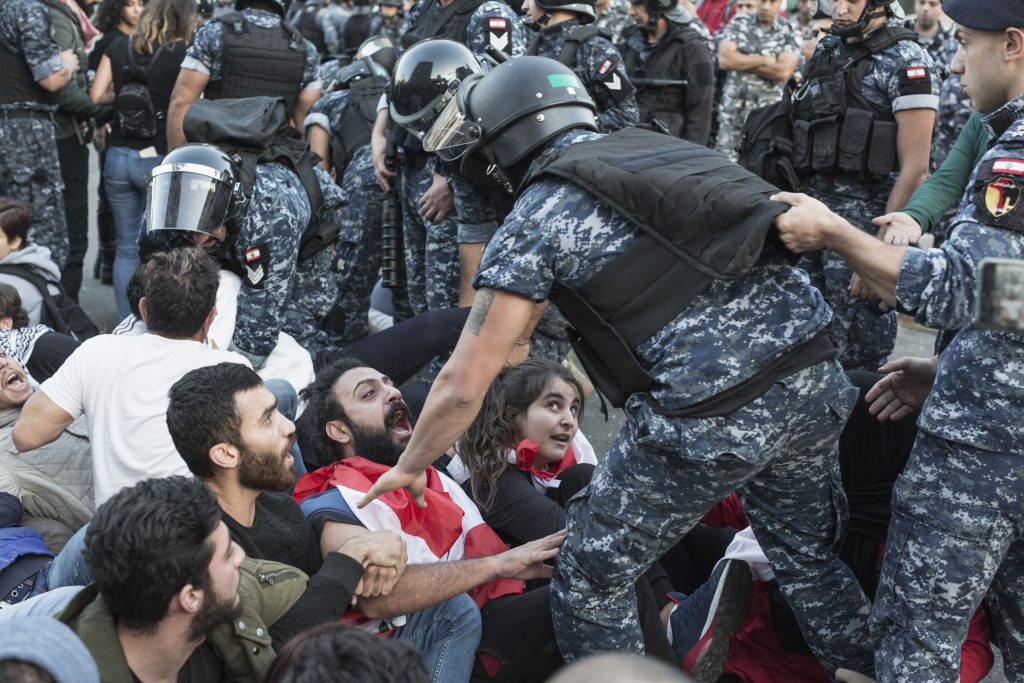
American Leverage
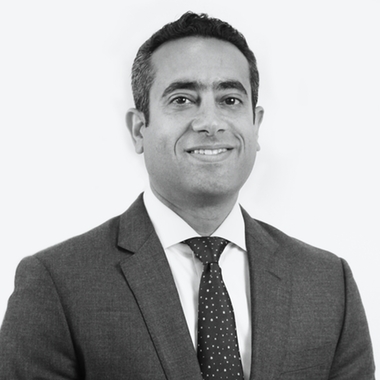 Michael: In Iraq, the United States seems largely absent as a diplomatic presence as the protests have escalated and grown. In some ways that might be preferable: U.S. diplomatic interventions under this administration and at this juncture are not likely to be productive. Following the protests in front of the Iranian consulate in Karbala, in which protesters decried Iranian interference in Iraq and attempted to set fire to the consulate’s perimeter, President Trump retweeted videos of the protests, suggesting his approval despite the attempted assault on a diplomatic facility. While Iran and its allies within the Iraqi government were always going to direct conspiratorial blame for the protests in the direction of the United States, Trump’s actions are still clearly unhelpful. There has always been a real concern among America’s partners in Iraq that Iraq could get caught up in the United States’s ill-conceived policy of maximum pressure against Iran. Exporting zero sum approaches to Iran into Iraq would be incredibly myopic, particularly as Iran is actively undermining its own position in the country through its handling of the protests. While it’s clearly an exaggeration to suggest, as some have done, that Iran’s role is the key animating rationale for the protests, it is nonetheless absolutely clear that Iranian overreach has fueled Iraqi bitterness, frustration, and anger.
Michael: In Iraq, the United States seems largely absent as a diplomatic presence as the protests have escalated and grown. In some ways that might be preferable: U.S. diplomatic interventions under this administration and at this juncture are not likely to be productive. Following the protests in front of the Iranian consulate in Karbala, in which protesters decried Iranian interference in Iraq and attempted to set fire to the consulate’s perimeter, President Trump retweeted videos of the protests, suggesting his approval despite the attempted assault on a diplomatic facility. While Iran and its allies within the Iraqi government were always going to direct conspiratorial blame for the protests in the direction of the United States, Trump’s actions are still clearly unhelpful. There has always been a real concern among America’s partners in Iraq that Iraq could get caught up in the United States’s ill-conceived policy of maximum pressure against Iran. Exporting zero sum approaches to Iran into Iraq would be incredibly myopic, particularly as Iran is actively undermining its own position in the country through its handling of the protests. While it’s clearly an exaggeration to suggest, as some have done, that Iran’s role is the key animating rationale for the protests, it is nonetheless absolutely clear that Iranian overreach has fueled Iraqi bitterness, frustration, and anger.
So in an important sense, it would be wise, even best, for the United States to take a do-no-harm posture to ongoing events, as these protests are not primarily a reaction to the U.S. role in the country. That being said, the actions of the Iraqi government are increasingly repressive and violent, and a responsible and engaged United States should be seeking to restrain Iraq’s responses to the demonstrations, particularly the responses of those organs of the Iraqi Security Forces with which it has cultivated strong ties through its many years of active military operations in the country. That’s something the United States should really be doing, and there’s no sign that it is.
 Thanassis: In a related vein, it was a terrible idea for the United States to cut funding to the Lebanese Army, which is one of the few somewhat capable institutions in Lebanon, with a reputation for representing the entire country rather than just one sect or movement. The Trump White House froze $105 million in critical funding to the Lebanese Armed Forces, overruling the U.S. government’s own official recommendation. It should have been a no-brainer for the United States to strike a balance here: condemn violence against protesters, keep a distance from egregious abuses by the rulers against peaceful demonstrators, and offer support for serious reform.
Thanassis: In a related vein, it was a terrible idea for the United States to cut funding to the Lebanese Army, which is one of the few somewhat capable institutions in Lebanon, with a reputation for representing the entire country rather than just one sect or movement. The Trump White House froze $105 million in critical funding to the Lebanese Armed Forces, overruling the U.S. government’s own official recommendation. It should have been a no-brainer for the United States to strike a balance here: condemn violence against protesters, keep a distance from egregious abuses by the rulers against peaceful demonstrators, and offer support for serious reform.
 Michael: What emerges at a political level from the protests will be the key determinant in U.S.–Iraqi relations going forward, but the nature of Iraq’s response to the protesters could really complicate U.S.–Iraqi relations. If Iraq’s response continues in the current repressive manner and even escalates further, then there will rightfully be pointed questions about the viability of future U.S.–Iraqi security cooperation—particularly in Congress. Generally, the Trump administration has shown muted concern for human rights issues, but increased repression and violence could poison Iraqi politics and undermine U.S. support for a complicated but important relationship.
Michael: What emerges at a political level from the protests will be the key determinant in U.S.–Iraqi relations going forward, but the nature of Iraq’s response to the protesters could really complicate U.S.–Iraqi relations. If Iraq’s response continues in the current repressive manner and even escalates further, then there will rightfully be pointed questions about the viability of future U.S.–Iraqi security cooperation—particularly in Congress. Generally, the Trump administration has shown muted concern for human rights issues, but increased repression and violence could poison Iraqi politics and undermine U.S. support for a complicated but important relationship.
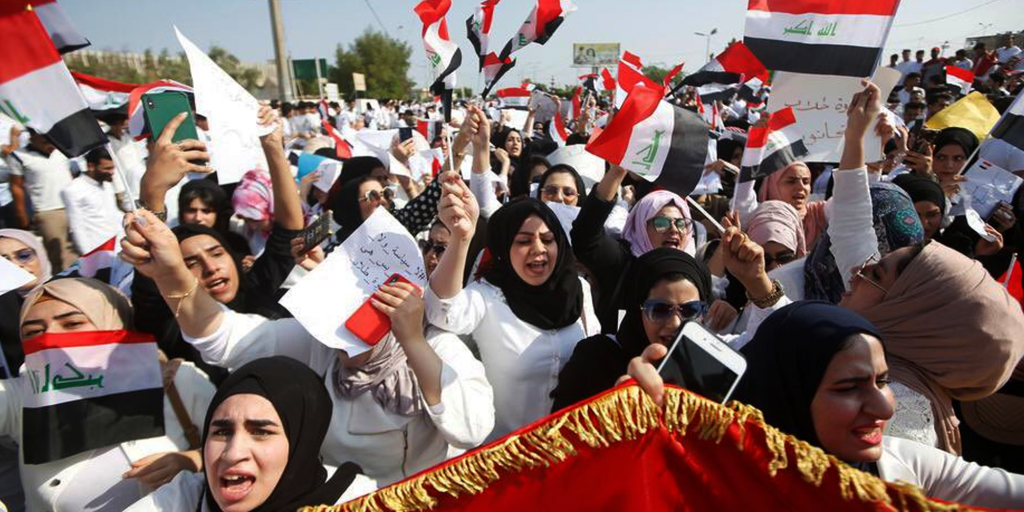
There is of course U.S. law, namely the Leahy Act, that theoretically bars assistance “to any unit of the security forces of a foreign country if the Secretary of State has credible information that such unit has committed a gross violation of human rights.” Critics note that the law itself has “too many exceptions, and is under-applied,” which is obviously true, but it is still a reminder that security cooperation could be much more difficult to justify going forward if Iraq undertakes a much more violent response.
And while Iraqis are understandably focused on their own future, the United States has interests at stake there too, and needs a responsible partner in Baghdad if it hopes to sustain effective regional policy.
Iran’s Hard Line
 Dina: The United States might not be paying a lot of official attention to the protests, but Iran is heavily invested in them. Both Iraq and Lebanon are key areas of concern for Iranian influence in the region. Iraq is a neighboring country with which Tehran shares over 900 miles of porous border, and in which it has economic, political, and religious interests. The last time Iran and Iraq were at direct odds with one another, the two fought an eight-year war that was devastating to Iran. As a result, Iran has built ties with and influence over non-state militias that were instrumental in pushing back ISIS in Iraq. In Lebanon, Iran is able to project power right up to the shores of the Mediterranean, and onto Israel’s doorstep. Iran has invested considerably in the development of Lebanon’s soft and hard power and has built what Iran deems to be its greatest “success story”: Hezbollah.
Dina: The United States might not be paying a lot of official attention to the protests, but Iran is heavily invested in them. Both Iraq and Lebanon are key areas of concern for Iranian influence in the region. Iraq is a neighboring country with which Tehran shares over 900 miles of porous border, and in which it has economic, political, and religious interests. The last time Iran and Iraq were at direct odds with one another, the two fought an eight-year war that was devastating to Iran. As a result, Iran has built ties with and influence over non-state militias that were instrumental in pushing back ISIS in Iraq. In Lebanon, Iran is able to project power right up to the shores of the Mediterranean, and onto Israel’s doorstep. Iran has invested considerably in the development of Lebanon’s soft and hard power and has built what Iran deems to be its greatest “success story”: Hezbollah.
Under the leadership of the Revolutionary Guards’ elite forces, the Qods Force, led by Qassem Soleimani, Iran has increased its presence in the region in a very visible manner. But not everyone in Tehran was on board with that escalation, with elements of the country’s political system calling for caution and restraint for fear of a backlash against Iranian adventurism. And spark a backlash it did, with protesters in Iraq chanting “Free, free Iraq, Iran get out, get out” in recent protests.
 Thanassis: Is Iran miscalculating? Or have Iran’s incentives changed from where they were a decade ago, when Iran benefited from regional disorder and a type of “constructive ambiguity,” without the need to dictate a 100-percent Iran-aligned alliance in places like Iraq and Lebanon that it considers part of its sphere of influence?
Thanassis: Is Iran miscalculating? Or have Iran’s incentives changed from where they were a decade ago, when Iran benefited from regional disorder and a type of “constructive ambiguity,” without the need to dictate a 100-percent Iran-aligned alliance in places like Iraq and Lebanon that it considers part of its sphere of influence?
 Dina: Tehran has demonstrated considerable short-sightedness in its response to the protests. Rather than capitalising on them and presenting Iran as a defender of minorities and “the oppressed,” Tehran has instead accused foreigners of stoking unrest in Iraq, and has urged protestors to draw on lawful means of bringing about change. Supreme Leader Khamenei has also alluded to the way Iran squashed the 2018 protests at home, indicating what he considers the appropriate reaction. In the current protests, Iranian-backed militias also shot at protesters in Iraq, while Hezbollah supporters beat protesters in Lebanon. This apparently state-sanctioned violence sparked further discontent in Iraq and Lebanon, including an attempt by demonstrators to storm the Iranian consulate in Karbala, and a statement by Grand Ayatollah Ali Sistani, Iraq’s leading cleric, warning of “chaos and destruction” if the Iraqi government cracked down on protests with foreign support.
Dina: Tehran has demonstrated considerable short-sightedness in its response to the protests. Rather than capitalising on them and presenting Iran as a defender of minorities and “the oppressed,” Tehran has instead accused foreigners of stoking unrest in Iraq, and has urged protestors to draw on lawful means of bringing about change. Supreme Leader Khamenei has also alluded to the way Iran squashed the 2018 protests at home, indicating what he considers the appropriate reaction. In the current protests, Iranian-backed militias also shot at protesters in Iraq, while Hezbollah supporters beat protesters in Lebanon. This apparently state-sanctioned violence sparked further discontent in Iraq and Lebanon, including an attempt by demonstrators to storm the Iranian consulate in Karbala, and a statement by Grand Ayatollah Ali Sistani, Iraq’s leading cleric, warning of “chaos and destruction” if the Iraqi government cracked down on protests with foreign support.
These protests were an opportunity for Tehran to re-assess and modify its presence in these countries in order to increase its popularity. Instead, Tehran chose to entrench itself, bolstering anti-Iran sentiment along the way.
To Iran, these protests are a real concern and a major threat to the interests and influence it has spent so long building and cultivating, in both Lebanon and Iraq. This explains their overly hardline approach to them. But their response is also evidence of the Islamic Republic’s short-sightedness when it comes to dealing with expressions of discontent: these protests were an opportunity for Tehran to re-assess and modify its presence in these countries in order to increase its popularity. Instead, Tehran chose to entrench itself, bolstering anti-Iran sentiment along the way.
 Michael: It’s also worth noting what these developments in Iraq say more broadly about the limits of Iran’s power. Iran has been opportunistic and projected power during the tumultuous aftermath of the Arab uprisings, leveraging its longstanding capacity to cultivate armed militant groups. But this hard-power approach ended up alienating almost all non-Shia constituencies as the open-ended conflicts in the region took on an increasingly sectarian tenor, and has destroyed much of Iran’s soft power in the Arab world. In the case of Iraq, it has also triggered the natural resistance generated by Iraqi nationalism—including among many of Iraq’s Shia. Iran’s hubris and heavy-handedness have produced a myopic and self-defeating policy approach to Iraq, contradicting the image it cultivates of itself as a dexterous regional player and budding regional hegemon.
Michael: It’s also worth noting what these developments in Iraq say more broadly about the limits of Iran’s power. Iran has been opportunistic and projected power during the tumultuous aftermath of the Arab uprisings, leveraging its longstanding capacity to cultivate armed militant groups. But this hard-power approach ended up alienating almost all non-Shia constituencies as the open-ended conflicts in the region took on an increasingly sectarian tenor, and has destroyed much of Iran’s soft power in the Arab world. In the case of Iraq, it has also triggered the natural resistance generated by Iraqi nationalism—including among many of Iraq’s Shia. Iran’s hubris and heavy-handedness have produced a myopic and self-defeating policy approach to Iraq, contradicting the image it cultivates of itself as a dexterous regional player and budding regional hegemon.
Connections with Syria
 Thanassis: How does the current challenge to the ruling order in Iraq and Lebanon connect with the crises in Syria—and in particular with the whiplash caused by the sudden shift of U.S. policy in Northeast Syria and the subsequent violence and displacement?
Thanassis: How does the current challenge to the ruling order in Iraq and Lebanon connect with the crises in Syria—and in particular with the whiplash caused by the sudden shift of U.S. policy in Northeast Syria and the subsequent violence and displacement?
 Aron: There’s not much of a direct connection between Syria and events in Lebanon and Iraq, but there are plenty of ways in which these three countries influence each other indirectly.
Aron: There’s not much of a direct connection between Syria and events in Lebanon and Iraq, but there are plenty of ways in which these three countries influence each other indirectly.
If the political setup in Beirut and Baghdad changes or if, God forbid, conflict and chaos develop there, you’ll immediately see an echo in Syria and in the regional balance of power. And it goes both ways. If Trump were to bungle northeastern Syria to the extent that the Islamic State begins to respawn, Iraq will suffer, and it would also change how outsiders treat the Iraqi protests. That Iraq is going wobbly will weigh heavily on the minds of policymakers as they think about next steps in northeastern Syria.
The Iran factor is important, too. The protests are obviously not about Iran, but political change in Baghdad or Beirut will inevitably affect Hezbollah and Iran’s clients in Iraq, including militias fighting for the regime in Syria. But will they grow weaker or stronger, and what does Iran do to sustain its influence? How will the United States, Israel, and others react? It’s really unpredictable.
More generally, though, eight years of war in Syria has kind of exhausted everyone, and the idea that you could see order in Lebanon and Iraq crumble, too—it’s just too much. Even nations that otherwise disagree on everything now want to see basic stability return to the region.
One thing to keep in mind, which unfortunately tends to be overshadowed by the security dimension, is the social and economic angle. The Syrian and Lebanese economies are closely linked, and if Lebanese banks start to keel over, you will absolutely be seeing ripple effects in Syria, including in the moneyed elite around Bashar al-Assad. That, too, is unpredictable stuff, but it is one area where Trump’s decision to withdraw from the northeast might matter. The Syrian government had been hoping for an economic shot in the arm from recovering the oil fields under U.S. control. Now that’s not happening, and they will have to continue to buy their oil from the U.S.-backed Syrian Democratic Forces for a while longer, an arrangement which is draining state coffers. The Syrian government’s poor economic situation makes Lebanon even more crucial for Assad than it already was. He and his backers can’t afford to ignore what happens there—and they never would.
On the other end of the social ladder, you have a million or so Syrian refugees in Lebanon who could be squeezed by an economic downturn and who are always first in line to be scapegoated for Lebanon’s problems. The Lebanese government is already pushing people to return to Syria, where, of course, there’s very little for them to return to. There’s no institutional apparatus capable of handling their reintegration in an effective manner, there are no jobs, the infrastructure is broken, and many have lost their homes to the war—not to mention the fact that returnees could be arrested by the security agencies, or may be at risk of violence in their own communities.
The Islamic State Angle
 Thanassis: Are you worried that the Islamic State might take advantage of the unrest, perhaps viewing peaceful protest camps as targets, or regrouping while the Iraqi government is distracted?
Thanassis: Are you worried that the Islamic State might take advantage of the unrest, perhaps viewing peaceful protest camps as targets, or regrouping while the Iraqi government is distracted?
 Aron: It could happen, and I’m thinking of Iraq especially. The Islamic State is in the middle of its own transition right now, from Abu Bakr al-Baghdadi to Abu Ibrahim, his successor. But Islamic State cells in Iraq will stick to their priorities: they want to show that they’re still around by staging many and large operations, they want to break prisoners out of jail, and they want to pick off local leadership in Sunni areas. And as a general guiding principle, they want chaos. It doesn’t need to be jihadi-produced chaos—for the Islamic State, all chaos is good chaos. The more mayhem you have, the less effective the government will become, and the more opportunities will pop up.
Aron: It could happen, and I’m thinking of Iraq especially. The Islamic State is in the middle of its own transition right now, from Abu Bakr al-Baghdadi to Abu Ibrahim, his successor. But Islamic State cells in Iraq will stick to their priorities: they want to show that they’re still around by staging many and large operations, they want to break prisoners out of jail, and they want to pick off local leadership in Sunni areas. And as a general guiding principle, they want chaos. It doesn’t need to be jihadi-produced chaos—for the Islamic State, all chaos is good chaos. The more mayhem you have, the less effective the government will become, and the more opportunities will pop up.
It doesn’t need to be jihadi-produced chaos—for the Islamic State, all chaos is good chaos. The more mayhem you have, the less effective the government will become, and the more opportunities will pop up.
As for attacking protest camps—maybe. Bombing a square full of unarmed people who are calling for fair politics and food on the table is no way to make yourself popular, but they’re not looking for popularity. They’re looking for chaos. What you could have is unclaimed attacks on protesters or security forces, attacks that can’t be traced back to the Islamic State. You’d have rival theories about who did it and why, about who benefits. There could be calls for vengeance. The Islamic State wants to stir up violence and feed mutual suspicions as part of a strategy of tension.
Then again, the situation now is very different from how it was back in 2012–2013, when the Islamic State exploited Sunni protests against the Nouri al-Maliki government to rebuild its influence. The Islamic State can no longer count on Syria and Syrian territory for strategic depth and an arms channel for a jihadist insurgency. The Iraqi Sunni grievances that the Islamic State wants to exploit are of course still there, but most people in those communities seem to be thoroughly alienated from the Islamic State after living under its abusive and catastrophic rule. Also, would-be protesters have much less room to organize in these areas than do Iraqi citizens elsewhere. Authorities tend to be way more repressive and intolerant in the recaptured Sunni areas than they are elsewhere in Iraq. Human Rights Watch just reported on how, in Anbar, people are being arrested simply for writing in favor of the protests on Facebook. That type of repression is terrible, and it will create its own political problems down the road. But from a narrow security perspective, harsh tactics like that probably do limit the Islamic State’s ability to exploit anti-government anger.
